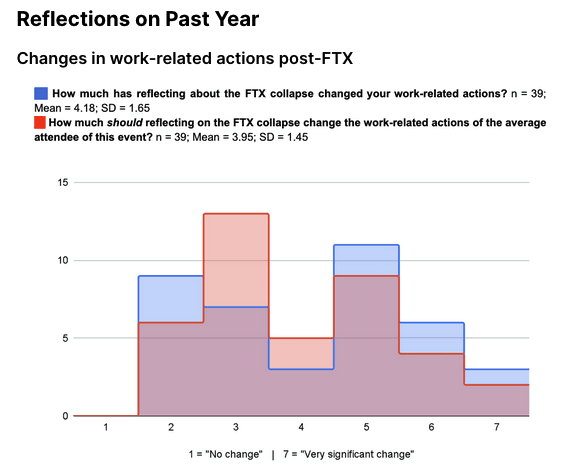A brief and belated update: When I resigned from the board of EV US last year, I was planning on writing about that decision. But I ultimately decided against doing that for a variety of reasons, including that it was very costly to me, and I believed it wouldn’t make a difference. However, I want to make it clear that I resigned last year due to significant disagreements with the board of EV and EA leadership, particularly concerning their actions leading up to and after the FTX crisis.
While I certainly support the boards’ decision to pay back the FTX estate, spin out the projects as separate organizations, and essentially disband EV, I continue to be worried that the EA community is not on track to learn the relevant lessons from its relationship with FTX. Two things that I think would help (though I am not planning to work on either myself):
- EA needs an investigation, done externally and shared publicly, on mistakes made in the EA community’s relationship with FTX.[1] I believe there were extensive and significant mistakes made which have not been addressed. (In particular, some EA leaders had warning signs about SBF that they ignored, and instead promoted him as a good person, tied the EA community to FTX, and then were uninterested in reforms or investigations after the fraud was revealed). These mistakes make me very concerned about the amount of harm EA might do in the future.
- EA also needs significantly more clarity on who, if anyone, “leads” EA and what they are responsible for. I agree with many of Will MacAskill’s points here and think confusion on this issue has indirectly resulted in a lot of harm.
CEA is a logical place to house both of these projects, though I also think leaders of other EA-affiliated orgs, attendees of the Meta Coordination Forum, and some people at Open Philanthropy would also be well-suited to do this work. I continue to be available to discuss my thoughts on why I left the board, or on EA’s response to FTX, individually as needed.
- ^
Although EV conducted a narrow investigation, the scope was far more limited than what I’m describing here, primarily pertaining to EV’s legal exposure, and most results were not shared publicly.


It seems to me that a case study of how exactly FTX occurred, and where things failed, would be among one of the best things to use to figure out what thing to do instead.
Currently the majority of people who have an interest in this are blocked by not really knowing what worked and didn't work in the FTX case, and so probably will have trouble arguing compellingly for any alternative, and also lack some of the most crucial data. My guess is you might have the relevant information from informal conversations, but most don't.
I do think also just directly looking for an alternative seems good. I am not saying that doing an FTX investigation is literally the very best thing to do in the world, it just seems better than what I see EA leadership spending their time on instead. If you had the choice between "figure out a mechanism detecting and propagating information about future adversarial behavior" and "do an FTX investigation", I would feel pretty great about both, and honestly don't really know which one I would prefer. As far as I can tell neither of these things is seeing much effort invested into it.